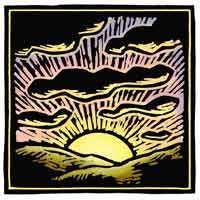The story of the Magi is compelling, almost fantastic. Men from the East, guided only by a star, find their way to a stable to worship the son of God. One can see why Matthew included it in his narrative; it immediately piques the readers interest. Kings bearing exotic gifts bowing before a newborn infant: just what child is this?
The story is also an excellent piece of propaganda. Matthew was writing at a time when the question of whether a Gentile could become a Christian was much disputed. Paul ministered to the Gentiles, but others believed Christians had first to undergo certain Jewish initiation rites before professing the faith. Matthew sides with Pauls view, reminding readers that among the first to recognize Jesus divinity were three men from the East (who have since come to be known by the exotic names of Caspar, Melchior and Balthasar).
That these men were of varied ancestry has not been lost on the millions of ethnic Catholics who celebrate the feast of the Tres Reyes with a special enthusiasm. Sometimes we in the West incorrectly conclude that since the spiritual heart of Catholicism is in Rome, ours is a Western religion. The story of the Magi is a reminder that the Christ Child came to save all peoples. The Catholic Church is truly a universal church.
All we know about the Magi concerns the end of their journey. What happened along the way remains a mystery. Theirs was the first Christian pilgrimage; and in the centuries since they made their trip, millions of Catholics have followed their example. Pilgrimage is among the richest of Christian traditions, one that continues to this day in places like Santiago de Compostela in Spain and Knock in Ireland.
The spirituality of pilgrimage teaches that we can draw closer to God by contemplating his graces as we travel toward him. It is a physical manifestation of the spiritual journey that we seek to undergo during seasons like Lent and Advent. Pilgrims would often travel rough roads and depend on strangers for shelter at night. They believed that physical hardship could help enable spiritual purification, and that God would take care of their needs.
Pilgrimage is not a common pursuit for Catholics today, but travel can still be an occasion for spiritual reflection. Leaving home can be an unpleasant experience, one that reminds us that we are ultimately dependent on God. Even the most meticulous planner cannot foresee every event that may happen on the road. Something always surprises. So we must put our faith in God knowing that despite airport delays, missed trains or unfamiliar languages, we are not alone.
Of course the Magi probably traveled in style on their way to Bethlehem. Wherever they were from, these kings almost certainly had servants in tow. And unlike most pilgrims, these men knew nothing of the Christ Child they would ultimately find. They simply followed a star, a most rudimentary form of global positioning system. Yet they had faith that they would find their way.
Jesus begins his own journey after his baptism in the Jordan, the feast that follows Epiphany in the liturgical cycle and concludes the Advent-Christmas season. From his home in Nazareth, through Galilee and on to Jerusalem, he preaches to both Jews and Gentiles, tax collectors and prostitutes. After Jesus resurrection and ascension, his apostles begin their own journeys to the ends of the Roman Empire and beyond, bringing Christs message to all who would hear it.
Perhaps in their travels they found themselves in the land of the three kings, where the first journey to Christ began. It seems only appropriate that years after that fateful pilgrimage to the newborn Christ, word of the risen Christ would reach the home of those intrepid travelers from the East.








